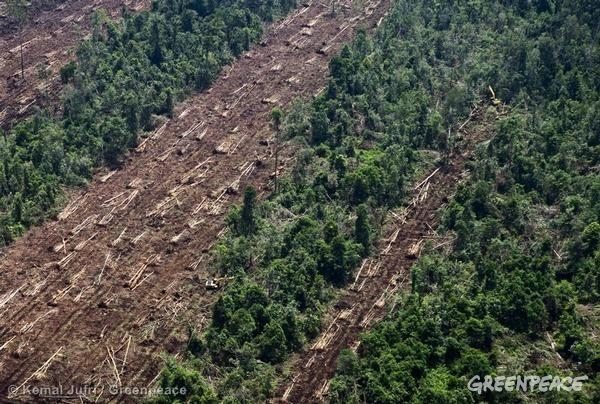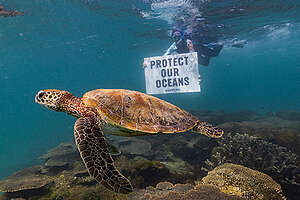This morning in Jakarta APP invited journalists to the launch of what it’s PR people grandly referred to as the ‘biggest announcement yet’ which would ‘reveal APP’s greatest commitment to natural forest protection as part of its sustainability program’.

Blogpost by Bustar Maitar, Forest Campaigner, Greenpeace SEA
Greenpeace was deliberately stopped from entering the press conference where APP then announced what are apparently new measures to protect high conservation forests (HCVF) in Indonesia. Starting from the 1st June APP said it will ’suspend natural forest clearance while HCVF assessments are conducted’ in areas ‘owned’ (more on that later) by the company.
Sounds positive so far, but allow me to illustrate the problem. Here is a snippet from an advert that APP ran in the New York Times back in 2006, titled ‘Conservation beyond Compliance’:
So if APP was already committed to action to protect HCV forests back in 2006 (and apparently earlier) then what, you might ask, has been going on for the last six years? Well, unfortunately not a lot of forest protection. The company has continued to be supplied by clearance of natural forests, including those of high conservation value. In fact, as the NGO coalition ‘ Eyes on the Forest’ has reported, APP has even cleared areas previously identified as high conservation value forests by third parties.
But this hasn’t stopped APP from repeatedly making this same claim. Just last year Aida Greenbury, who led at the Jakarta press conference today, stated that ‘any land which is to be converted must not contain High Value Conservation Forest (HVCF)’.
So, given the company’s track record, it’s a little difficult to see today’s announcement either as ‘new’ or something that can be welcomed as real progress. And that difficulty is made a whole lot worse when the small print is considered. The new commitments will apply to areas ‘owned ’ by APP. So how much of the supply chain do they own? Rather inconveniently no information or supporting evidence has been provided to answer that question, but we have heard previously that APP claims that less than half is controlled by the company. Not the most plausible figure.
It could have been so different if APP followed the approach taken by their sister company in the Sinar Mas Group, Golden Agri Resources. GAR introduced a forest conservation policy last year that committed the company to not develop its plantations on forests or peatland. You can read more about that here.
If APP wanted to convince customers and other stakeholders that it’s changing, why didn’t it follow GAR’s lead? Instead the company has thrown away a real opportunity to convince them that it is serious about reform. The losers continue to be Indonesia’s forests and peatlands, as well as the reputation of Indonesia’s forest sector.


